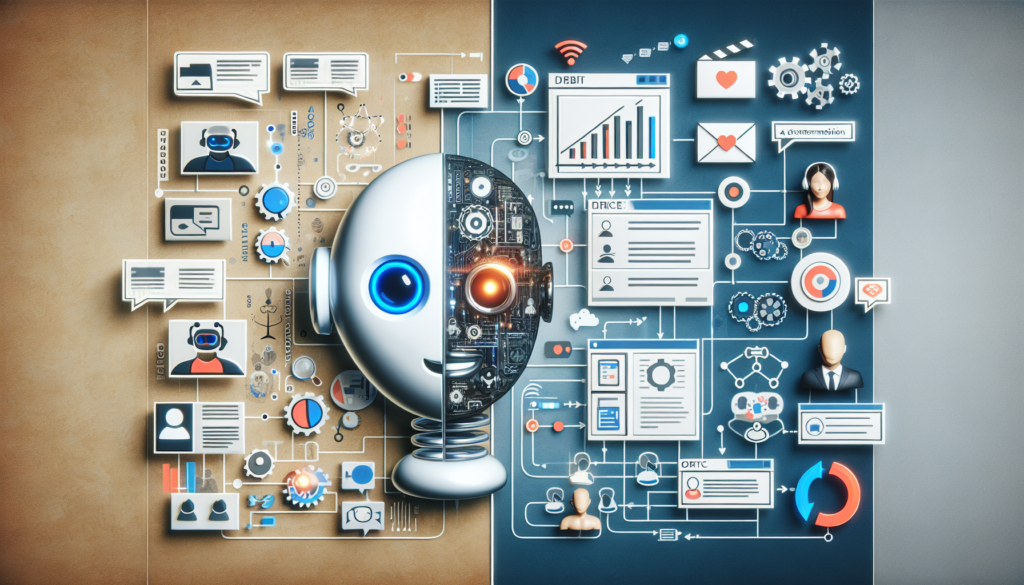Artificial intelligence has significantly impacted the realm of customer service, leading to the integration of automated response systems, such as chatbots, within Customer Relationship Management (CRM) solutions. The symbiosis between chatbots and CRM aims primarily to improve and personalize interactions with customers, while increasing efficiency and the collection of valuable data for businesses.
Technical Advances in Chatbots and CRM
With the evolution of artificial intelligence and natural language processing (NLP), chatbots have gained the ability to understand and respond to complex requests in a human context. For example, Facebook Messenger’s API deploys chatbots capable of handling a wide range of customer service functions through the messaging platform.
On the other hand, CRM systems have evolved from customer databases to highly interactive and integrated systems that leverage predictive analytics and automation to customize customer interactions. CRM solutions like Salesforce and Microsoft Dynamics are at the forefront, offering platforms that combine analytics, artificial intelligence, and the ability to integrate additional functions, such as chatbots, through APIs.
Implementation of Chatbots Within CRM
The integration of chatbots into CRM systems should be conceptualized as part of an omnichannel strategy, where every customer interaction is an opportunity to collect data and provide a consistent and personalized experience. To this end, data synchronization between the chatbot and the CRM must be ensured, allowing information gathered by the chatbot during a conversation to be immediately accessible within the CRM for further analysis or follow-up.
Connection Through APIs: APIs act as bridges between chatbots and CRM systems. For example, Salesforce’s API allows the data collected by the chatbot to be reported directly within the customer’s record in Salesforce, ensuring that information is updated and can be utilized by the customer service team in real time.
Training with NLP and Machine Learning: Once integrated, chatbots require constant feedback and training to improve the quality of their responses. Machine learning enables the chatbot to become more precise in understanding user intentions and emotions with each interaction.
Automation of Tasks: Inserting chatbots within the CRM strategy allows for the automation of repetitive tasks, such as updating databases, scheduling appointments, or sending reminders, thus freeing up valuable time for customer service teams to focus on more complex cases that require human intervention.
Practical Ways to Improve Customer Service
24/7 Availability: The integration of chatbots into a CRM strategy means that customers can receive real-time responses at any time of day, improving customer satisfaction and loyalty.
Personalization at Scale: With the accumulation of data provided by a CRM, chatbots can deliver personalized responses and solutions based on each customer’s history and preferences, aligning interactions with the company’s marketing strategy.
Reduction of Waiting Times: By handling basic requests, chatbots reduce the workload on customer service teams, thereby decreasing waiting times for issues that require more personalized assistance.
Comparisons and Use Cases
Compared to previous customer service systems, chatbots integrated with CRM represent a qualitative leap in efficiency and personalization. An illustrative use case is Banco Bilbao Vizcaya Argentaria (BBVA), which adopted an integrated chatbot in its CRM that handles more than 50% of initial interactions, reducing response time and increasing effectiveness in customer service.
Future Projections and Potential Innovations
The integration between chatbots and CRM is in a fast-developing phase. The trend points towards the creation of increasingly autonomous systems capable of executing more complex operations. An evolution towards chatbots with advanced NLP capabilities and sentiment comprehension is expected, adapting and learning from each interaction more accurately.
To stay current with these developments, it is crucial to maintain a proactive attitude towards innovation, being willing to adopt new technologies and methodologies that can provide competitive advantages. Furthermore, real-case experiences will continue to be a rich source of information and inspiration, demonstrating the effectiveness of these tools across various industries.
In summary, the integration of chatbots with CRM systems updates the scope and efficiency of customer service, offering a platform for a more personalized, reactive, and effective service. The adoption of these technologies represents not only an improvement in customer-company interaction but also foreshadows a redefinition of customer service methodologies in the near future.

